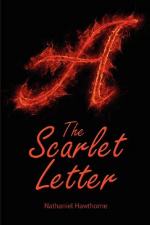Pearl had not found the hour pass wearisomely while her mother sat talking with the clergyman. The great black forest—stern as it showed itself to those who brought the guilt and troubles of the world into its bosom—became the playmate of the lonely infant, as well as it knew how. Sombre as it was, it put on the kindest of its moods to welcome her. It offered her the partridge-berries, the growth of the preceding autumn, but ripening only in the spring, and now red as drops of blood upon the withered leaves. These Pearl gathered, and was pleased with their wild flavour. The small denizens of the wilderness hardly took pains to move out of her path. A partridge, indeed, with a brood of ten behind her, ran forward threateningly, but soon repented of her fierceness, and clucked to her young ones not to be afraid. A pigeon, alone on a low branch, allowed Pearl to come beneath, and uttered a sound as much of greeting as alarm. A squirrel, from the lofty depths of his domestic tree, chattered either in anger or merriment—for the squirrel is such a choleric and humorous little personage, that it is hard to distinguish between his moods—so he chattered at the child, and flung down a nut upon her head. It was a last year’s nut, and already gnawed by his sharp tooth. A fox, startled from his sleep by her light footstep on the leaves, looked inquisitively at Pearl, as doubting whether it were better to steal off, or renew his nap on the same spot. A wolf, it is said—but here the tale has surely lapsed into the improbable—came up and smelt of Pearl’s robe, and offered his savage head to be patted by her hand. The truth seems to be, however, that the mother-forest, and these wild things which it nourished, all recognised a kindred wilderness in the human child.
And she was gentler here than in the grassy-margined streets of the settlement, or in her mother’s cottage. The Bowers appeared to know it, and one and another whispered as she passed, “Adorn thyself with me, thou beautiful child, adorn thyself with me!”—and, to please them, Pearl gathered the violets, and anemones, and columbines, and some twigs of the freshest green, which the old trees held down before her eyes. With these she decorated her hair and her young waist, and became a nymph child, or an infant dryad, or whatever else was in closest sympathy with the antique wood. In such guise had Pearl adorned herself, when she heard her mother’s voice, and came slowly back.
Slowly—for she saw the clergyman!
XIX. THE CHILD AT THE BROOKSIDE
“Thou wilt love her dearly,” repeated Hester Prynne, as she and the minister sat watching little Pearl. “Dost thou not think her beautiful? And see with what natural skill she has made those simple flowers adorn her! Had she gathered pearls, and diamonds, and rubies in the wood, they could not have become her better! She is a splendid child! But I know whose brow she has!”




